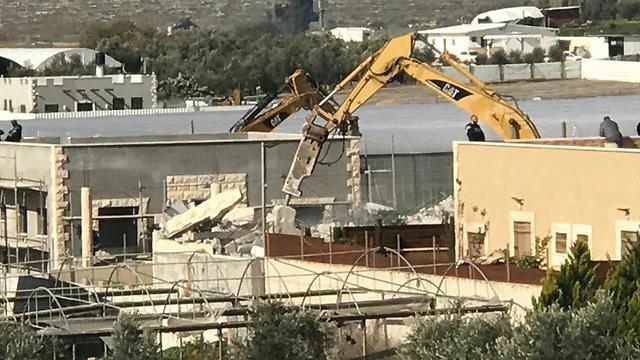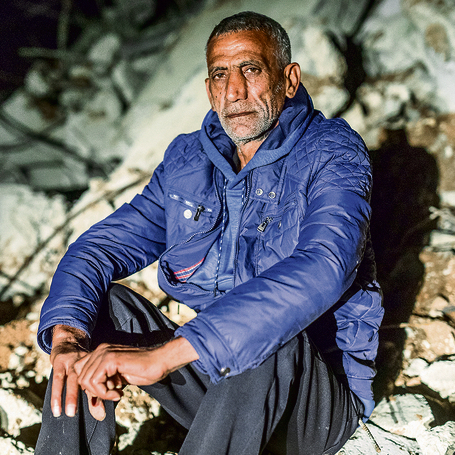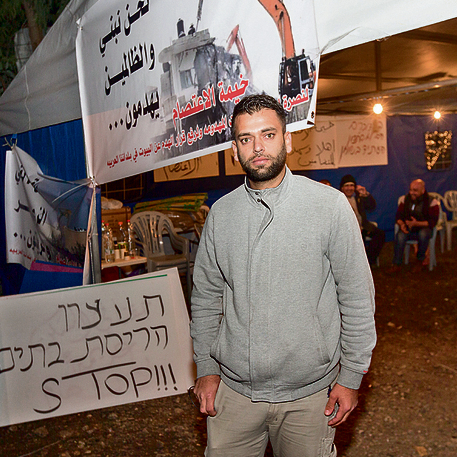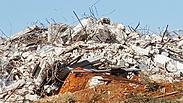
Arab sector ‘on verge of explosion,’ Qalansawe mayor warns
A week before bulldozers arrived in the Bedouin village of Umm al-Hiran, illegal homes were demolished in the Israeli Arab city of Qalansawe. While the local protests ended peacefully, the city’s mayor says the lack of lands has already driven Qalansawe’s residents to desperation.
But these are not good days for Qalansawe. Last month, on January 10, 11 illegal homes were demolished in the city. Since then, Qalansawe has been protesting. Many cups of coffee have been poured in the protest tent set up at the entrance to the city, as if trying to pacify the infuriated atmosphere.
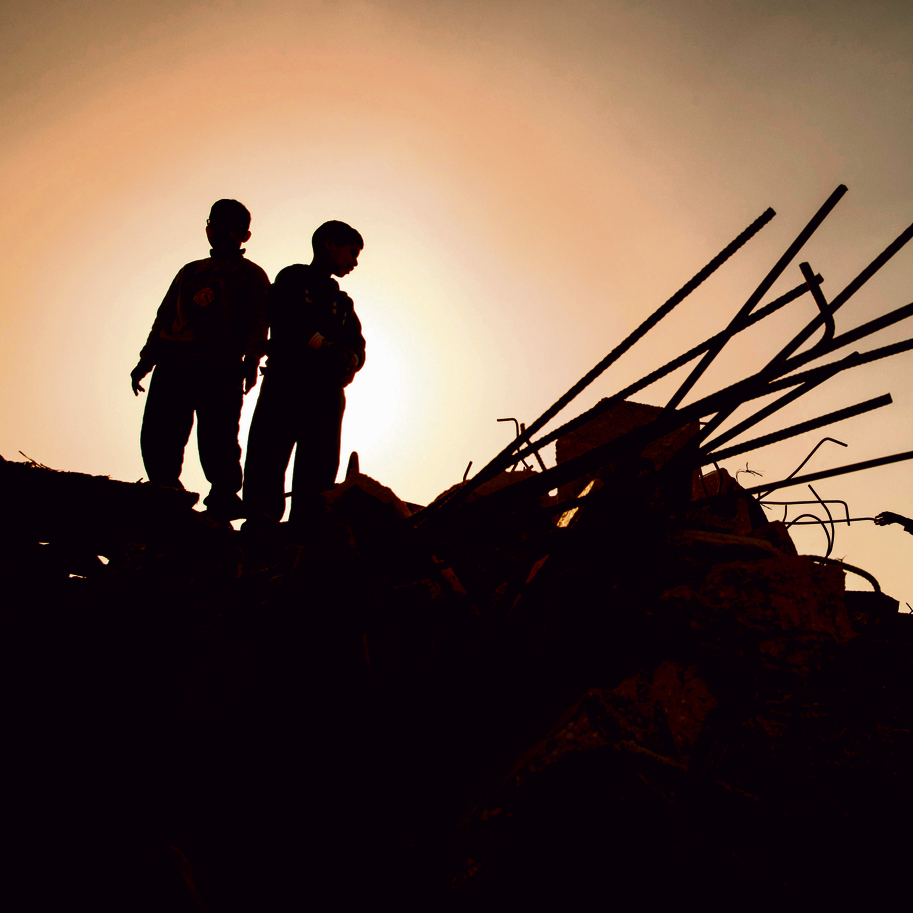
Alongside protests and larger gatherings, a regular protest watch is held at the tent. Handwritten signs demand that Prime Minister Benjamin Netanyahu stop the demolition of homes in the Arab sector. Young and old, women and children, sit in circles, talking. Jewish women from the Sharon region arrive to show their solidarity.
There is tension in the air, anger, frustration, but zero violence. All the protest activities, including a demonstration of 20,000 people near the demolished buildings, are relatively calm. Police officers are not run over, and roads are not blocked.
"And that’s the most frustrating thing,” says Qalansawe resident Hasuna Makhlouf, whose sons' and siblings’ homes were demolished. “We have been protesting here for a week now and no one has showed any interest, apart from the local Arab media. As soon as blood was shed in Umm al-Hiran, they remembered us. Is that what they want? Blood? Suddenly, Israeli journalists are arriving too. Where have you been until now?
“I have been going through a nightmare since the homes were demolished. A nightmare. Two of my grandchildren are in such a state of shock and fear that they won’t leave my side. Even at night, they come to sleep with me in the room. How can you surprise a family like that at 5am when the children are inside and start destroying (their home)? On the morning after the demolition, I turned on the television. I was sure they would mention the demolition. Nothing. Nada. Not a word.”
Despite his anxiety, Hasuna was the person who tried to calm things down. During the first protest, at the entrance to the city, he called on the residents to avoid blocking the road and throwing stones. When one of the residents pulled out a Palestinian flag, Hasuna demanded he remove it.
On Friday, January 13, Hasuna was no longer able to remove the dozens of flags waved at the major protest in Qalansawe. Young Arabs from across the country flocked to the city, some marching with flags and chanting violent slogans such as “With our souls and blood we will redeem Palestine.”
“I was unable to control people who arrived from the outside,” he apologizes. “But I am one hundred percent Israeli, one hundred percent,” he says excitedly. “I respect the police and the army. Whenever they would come to wash their cars at my business, I would give them a reduction out of respect. For years, I worked as a driver at a senior citizens’ home in Netanya. Every day, I volunteered there beyond my working hours.”
Later, on our way to the demolished homes, Hasuna shows me a thank you letter he received from the Hadar senior citizens’ home in Netanya. “Take a picture of it,” he says. “Take a picture. We don’t hate Jews. We don’t want to throw them into the sea, as your prime minister claims. After the demolition, I was invited to the Netanya Municipality as an apology for destroying our home.
“I explain to my grandchildren that we will rebuild the homes, that we must not hate all the Jews because our home was demolished. But why doesn’t the state respect me? We are being suffocated. I have seven children, some married. Where will they live? In the air? Why aren’t they approving the construction of more homes in the city? Kfar Yona next to us has become a huge city, but we are just being suffocated. What does a person want? To live, to earn a living, to raise children. What are we asking for?”
Real distress
Before the State of Israel was founded, Qalansawe had 1,500 residents on an area covering 4,200 acres. Today, there are more than 20,000 people living in Qalansawe, but the city’s official area of jurisdiction is 2,075 acres. One-third of the city’s residents live outside the approved zone. A new zoning plan for the city’s expansion was prepared in 2000, but it has yet to be approved.
“When the zoning plan was prepared in 2000, they were thinking 20 years into the future. Seventeen years have passed and the plan has yet to be approved,” says Mayor Abed el-Basat Salame. “I am telling you that in 20 years from now, you will find Qalansawe’s residents in Petah Tikva and in Ra’anana. They will have no choice, because there are no lands in Qalansawe. There are state lands nearby. Why aren’t they being allotted to the city so that we can build residential areas for our young residents in an organized manner? The illegal construction is the result of real distress.
“I sense an explosion ahead of us. In the meantime, the protest is being held in an orderly manner, but I feel like I’m about to lose control. There will be an explosion here. If Bibi doesn’t calm down, and carries on with these home demolitions, there will be an explosion in the entire Arab sector. There have never been a case where 11 homes were destroyed just like that. They would destroy one building, at most two, once a year. And suddenly there’s this demolition and immediately afterwards, a demolition in Umm al-Hiran. The Arab sector is on the verge of exploding.”
On the morning of the home demolition, Salame announced his resignation. “If I can’t protect the residents of my city, there is no point in me being mayor,” he told the residents during a spontaneous protest.
“I came to that protest. I was the only Jew who arrived to show solidarity at the time,” says Yaniv Sagi, director of the Center for a Shared Society at Givat Haviva. “I met the mayor at the protest, and he was moved to tears. ‘Where are you?’ he asked me. ‘Why aren’t the Jews coming to show solidarity?’ I said to the mayor that he shouldn’t resign, that these forces are much greater than him, and that neither he nor anyone else can face them. The illegal construction issue in the Arab sector is a countrywide problem. Since the state’s establishment, 700 Jewish communities—but zero Arab communities—have been built. How can one talk about equal enforcement if the Israeli Arabs’ reality is so fundamentally unequal? This problem must be solved, but Netanyahu doesn’t want to solve it. He just wants to inflame the situation and divert the focus from the investigations against him. The deeper the investigation, the deeper the incitement against the Arab public.”
Four days later, the mayor reconsidered and rescinded his resignation, following demands from the city’s residents. The confidence they showed in him should not be taken for granted. The former mayor, Mahmoud Kahdega, was convicted of taking a bribe and of blackmail. Instead of taking care of the city’s development and the regulation of thousands of illegal buildings, he was busy making personal profits.
Salame is trying to rectify the situation, to instill proper management in the city and solve the housing crisis. He is unsuccessful. There is no one to help him. The State of Israel is finding it very difficult to solve the housing crisis in the Arab sector. Even when the authorities finally began developing towns and villages in the Arab sector, and advancing zoning plans, they failed to catch up to the reality on the ground. The planning was too slow compared to the accelerated construction taking place. In many cities, the planned zoning plan became irrelevant even before being approved, after entire neighborhoods had been built illegally. In many towns, residents objected zoning plans that included condominium complexes, claiming that they are unsuitable to the one-floor housing style which is common in the sector.
There is, however, massive illegal construction even in Arab towns with an approved zoning plan, so the claim that the lack of a zoning plan is the reason for the construction offenses is not always true. The construction offenders are often driven not by distress but by the cheap cost of illegal construction, which requires no tax payments. In any event, the Israeli government has so far failed to solve this mess for years, not even through enforcement, which is like a drop in the bucket compared to the huge amount of illegal buildings in the Arab sector.
Are we the enemy?
“Bibi is not trying to solve our housing problem. All he is trying to do is to lay down a smoke screen on the investigations against him,” says Fadi, a young Qalansawe resident who works as an electrician at a Netanya mall. “I wish he would go to jail already, Bibi. He has found a way to gain popularity. He inflames the Jewish street against the Arabs. It began with incitement in the elections, continued with the terror attack in Tel Aviv, in which he smeared Israel’s Arab, and is going on now. In the middle of the demolition, Netanyahu wrote in a Facebook post: ‘Our forces are operating in Qalansawe.’ What do you mean ‘our forces’? Are we the enemy that you have to use our forces against us?
“Netanyahu talks about equal enforcement. Has anyone offered us an alternative solution like in Amona? Has anyone compensated the families in Qalansawe? Or have they thrown them on the street in the middle of the winter? Bibi wrote in a post that he hadn’t slept for many nights trying to find a solution for Amona. How much sleep has he lost over Qalansawe? Is that equal?”
The prime minister’s associates, however, say that the home demolitions have nothing to do with the investigations against Netanyahu. They say the prime minister spoke about equal enforcement long before the investigations began, stressing that the decision on equal enforcement was made together with the government’s unprecedented decision to invest NIS 13 billion in bridging the gaps in the Arab sector.
But in Umm al-Hiran, the families were actually offered alternative land and compensation, and they turned down the offer.
“That’s not true. They were in the middle of negotiations with the government. They had already agreed to evacuate and there was a debate over where they would live temporarily until the permanent solution (can be found). And in the middle of the negotiations, Bibi decided to send bulldozers. And police officers arrived and simply murdered a math teacher, a school’s vice principal who was just moving his car.”
The police claim that he murdered a policeman. The government claims that the residents broke up the negotiations.
“The police and the government are lying, and so is the media,” Fadi believes, and so do all the residents listening to our conversations. “Anyone who was there says it had nothing to do with ISIS. It wasn’t a terrorist attack. He was just murdered. Why was the policeman buried so fast? Had they performed an autopsy, they would have seen that he wasn’t even run over. It’s possible that his friends shot him, and they are simply trying to cover it up.
“But let’s talk about Qalansawe. What about us? A demolition order was issued, and the bulldozers arrived here within 48 hours. There was no discussion, the families were not given a chance to appeal the demolition order in court, and the families were definitely not offered any compensation or some kind of housing solution.”
“I’m getting married in two months,” Fadi sighs with fire in his green eyes. “Fortunately, I built a home over my parents’ apartment, but in the past week I have been asking myself, ‘What for? Why get married? Where will my children live?’ Today, half a dunam in Qalansawe’s master plan costs about 1.5 million shekels. There are no lands, so those are the prices. I used to define myself as Israeli. Today I am definitely not Israeli. I’m telling you, soon things won’t be so calm. There will be an explosion. There will be a disaster.”
After the residents return to their homes, we escort Hasuna to his family’s non-home. A regular vehicle would have trouble driving there. Legal Qalansawe—with roads and street lighting—comes to an end and illegal, wounded Qalansawe breaks forth. Gravel roads with rain puddles and pits, complete darkness, and thousands of illegal homes, some of them 30 years old.
“I was already born in the illegal part of Qalansawe,” says Hasuna, “and my seven children were raised here too. They took my grandfather’s lands and built Tzoran. Why won’t they let us build on the few lands they left us?”
At the center of the neighborhood lie the ruins of what used to be 11 lively buildings. Crushed stones and bent iron scar the flat red loam soil. It’s hard to understand why these 11 homes were the ones destroyed. To our left and our right, we see hundreds of illegal structures. Life in the State of Israel’s backyard is no fun.
Asked to comment, the Finance Ministry’s housing department offered the following response: “The national unit for the enforcement of planning and construction laws is operating in accordance to the law, in full cooperation with the State Attorney’s Office and in accordance to its instructions, while strictly applying the law equally without any discrimination.”










